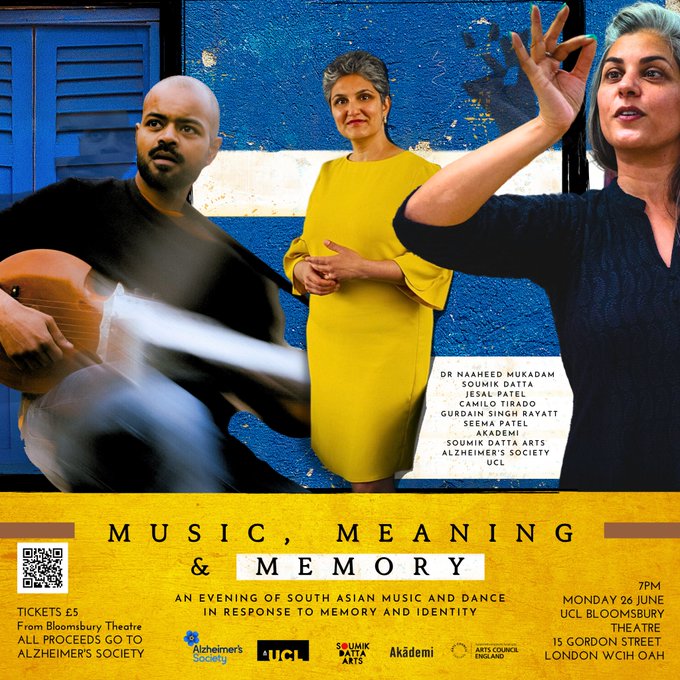Connecting with others through the power of music
By iomh, on 24 May 2023
A project to bring South Asian music and dance to people with dementia will be showcased next month at Bloomsbury Theatre. Dr Naaheed Mukadam, the researcher behind the project, shares her experiences of this project.

I have been a dementia researcher for more than 15 years and have always focused on ethnic inequalities, initially in the diagnostic pathway and more recently in genetic risk, prevention and post diagnostic support.
My research has highlighted the stigma that can exist around memory loss and dementia and I have tried to counteract this during my career so far. I am used to the scientific method – hypothesis testing and use of both qualitative and quantitative methods to answer specific questions. However, after attending public engagement workshops at UCL and reflecting on the power of personal stories in connecting with others, I started to think about how else I could go about capturing the experiences of those with dementia and those who care for them. Music was one way of connecting that I thought would be quite universal.
There are a number of organisations who run music related workshops and groups for people living with dementia and reports about these are overwhelmingly positive in terms of people feeling able to connect with others. However, the groups tend to be in English and focused on music that would be familiar for those growing up in the UK in the 50’s and 60’s. I started to wonder about connecting through music in minority ethnic communities and how to start this process.
Music and memory
I started enquiring among the public engagement groups at UCL about music and dance organisations that may have worked with people with dementia and was put in touch with Akademi – a dance organisation focused on South Asian dance forms. I also approached award-winning musical artist Soumik Datta who, with his organisation Soumik Datta Arts, was keen to work on this theme of music and memory.
We gained permission from a care home and day centre to conduct workshops focused around music and movement. We played different types of music and spoke to people within the care settings – both staff and attendees / residents about their memories, their identity, important pieces of music and how they make them feel. As a researcher this was quite a disorientating experience at first as I had no research question and no agenda.
I took notes about my experience and reflected on how wonderful it was just to relax and listen to people sharing their stories. People were often unable to or reluctant to speak much when asked direct questions, but their body language and responses to us sharing something of ourselves was more revealing. I also noted the difference in warmth and connection when I was able to speak in their native language rather than English.
Loss of connection
I held discussions with Soumik, dance artist Jesal and family carer Shibley Rahman about their perceptions and experiences with regards to memory loss. Themes that came up from this were the experience of loss of connection, loss of identity, ability to connect through music and other non-verbal means and repeated experiences of loss because of the fluctuating nature of memory loss. We used these themes to generate music and dance – sometimes through lyrics about loss in music and sometimes in more oblique ways, such as Soumik using echoes and loss of musical notes to show the loss of memory.
We wanted to spark conversations and reduce stigma around discussing memory problems, particularly in the South Asian community
Dr Naaheed Mukadam, Principal Research Fellow in the Division of Psychiatry
We wanted to showcase the work in a theatre to have the best visual and sound experience. My application to use Bloomsbury theatre was accepted through the departmental usage scheme and we are excited about being able to attract a diverse range of people including students, scientists and general members of the public to see what we have created. We wanted to spark conversations and reduce stigma around discussing memory problems, particularly in the South Asian community.
We hope to have a Q&A session after the performances to gain further feedback. Overall this process has really expanded my horizons as a researcher and allowed me to connect with people within the South Asian and creative communities and express myself creatively. I hope to continue building on these collaborations and bringing more creativity to research in future!
Mone Rekho: Music, Meaning and Memory takes place on 26 June at London’s Bloomsbury Theatre.
- Ten reasons why you should come along to the the 5th UCL IoMH International Conference on 18th September 2024
- Investigating the risk of suicide in patients with cancer: webinar co-hosted by the UCL Institute of Mental Health (IoMH) and the GRID Council (India)
- Top posts of 2023 on the IoMH blog
- Poor mental health is not random: what can we do to achieve social justice?
- Mental Health is a human right – a workplace perspective
 Close
Close

